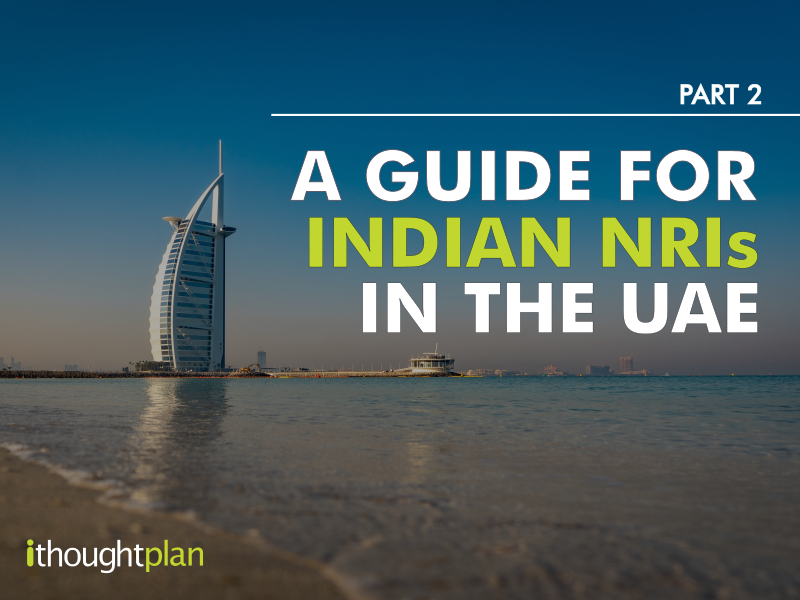
This is in continuation of our previous blog. In this blog, we will be covering the following aspects:
-
-
- Health Insurance in UAE
- Pension scheme for Expatriates
- The Retire in Dubai Scheme
- Investment Options
-
Health Insurance in UAE
As healthcare coverage is mandatory in the UAE, one will need to know how health insurance works throughout the emirate states. One cannot receive a UAE residency visa without proof of health insurance. Unlike Emirati nationals, ex-pats must pay for both private and public health insurance in the UAE.
The extent of coverage for employers and their dependents is determined by the employee’s salary, designation etc. The extent of coverage and type of policy/scheme would determine the cost of medical services.
| Abu Dhabi | Employers are required to provide health insurance coverage for their employees as well as four dependents (One spouse and up to three children under the age of 18; ex-pats with four or more children will have to take on their coverage themselves). |
| Dubai | Employers must provide medical insurance to their employees, but they are not required to cover dependents. Sponsors are required to get insurance cover for their resident dependents. |
| Sharjah and the Northern Emirates | Employers are not required to provide medical insurance for their employees. |
The UAE Health Card
In Dubai, if the employer does not offer health insurance coverage, one must apply for a health card. The health card offers basic health care coverage similar to what Emirati nationals receive through public healthcare.
Expats wishing to take advantage of public hospitals and clinics must have a health card, so even if one is covered by private health insurance, it is wise to apply for the health card.
Pension Schemes for Expatriates
Social security contributions are applicable in the UAE only for UAE and GCC nationals and do not extend to foreign workers. However, expatriates are legally entitled to an end-of service lump-sum pension which is based on years of service.
End of Services benefits for Expatriates in the Private Sector
-
-
- The worker is entitled to a gratuity for the served fraction of a year if he completes one year of continuous service.
- If the employee resigns of his or her own free will before completing one year, then they will not be entitled to any gratuity pay.
-
The end of service gratuity is calculated on the basis of the last wage to which the employee was entitled, namely the basic salary. Hence, it will not include allowances such as housing, conveyance, utilities, furniture etc.
End of Services benefits for Expatriates in the Ministries and Federal Entities
An expatriate employee must have completed at least one year of continuous service with the respective federal entity to be eligible.
End of service benefits for expatriates in the Government sector is calculated as per the following:
-
-
- One month’s basic salary for each year of service for the first five years of service
- One and a half month’s basic salary for each of the next five years of services, calculated based on the last five year’s average basic salary.
- Two months’ basic salary for each year of service, thereafter, calculated based on the last five year’s average basic salary.
-
The Retire in Dubai Scheme
When it comes to retirement, Emiratis can retire when they are 49 but expatriate residents can retire only when they turn 60. Expatriates who are older than 60 are allowed to work up to the age of 65 after obtaining approval from the Minister of Human Resources.
The Retire in Dubai initiative launched by the Government of Dubai offers “a global retirement programme” to foreigners aged 55 years and above, the opportunity to retire in Dubai.
-
-
- Validity: The Dubai retirement visa UAE is valid for up to 5 years. The visa must be renewed after the end of this tenure given that all visa requirements are met.
- Age: Residents aged over 55 years are eligible to apply for the 5-year retirement visa UAE.
- Eligibility Criteria for Retirement Visa in UAE: As per the regulations, those looking to continue staying in Dubai after they retire, must fulfil any one of the following conditions to obtain a retirement visa Dubai:
- Invest in a property in Dubai which is worth AED 2 million or more.
- Have a capital/savings of at least AED 1 million.
- Have a minimum monthly income of AED 20,000.
-
By fulfilling any of the above requirements, one can easily apply for this visa scheme and stay in Dubai post-retirement.
Investment Options
As there is no tax levied on income, there is a higher potential for savings for NRIs in the UAE. It is important that one evaluates various investment options available and builds a well-diversified portfolio.
There are multiple investment avenues available for NRI investors.
-
-
- Retirement Scheme offered by Employers
- Pension scheme offered by the UAE Government
- NRE Fixed Deposits in India
- Corporate Bonds in India
- Indian Equity market (Equity and Mutual Funds)
-
The quantum of investment allocation over various asset classes depends on an investor’s risk appetite.
If you are one of the NRIs in UAE and looking to retire, get in touch with us. Our award-winning financial planning team will help you plan for your retirement and guide you to choose the best investments in alignment with your goals.